Thoth in Egyptian Mythology
Thoth, the Egyptian god of knowledge, featured in the stories, myths and legends in Egyptian Mythology. According to one myth Horus lost his left eye in his war with Set who tore the eye into six pieces. Thoth, the god of wisdom and magic, was able to reassemble the eye and return it to Horus who gave the reassembled eye to his murdered father Osiris, thereby bringing him back to life. He is associated with jackal-headed god Anubis at the 'Weighing of the Heart' and with the Seshat, his female counterpart and the goddess of writing and libraries. Thoth also plays an important role in the legend concerning the Tree of Life. He is sometimes referred to as the consort of Ma'at, the goddess of truth, justice, morality and balance. 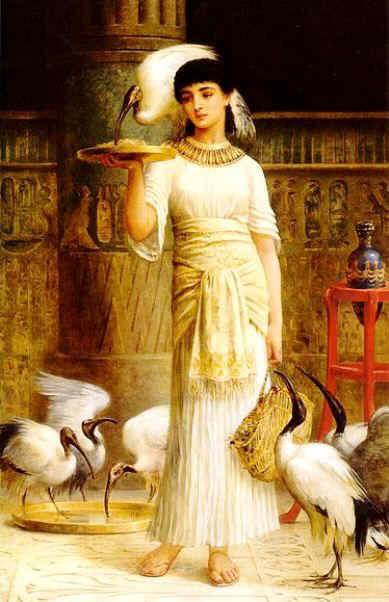
Priestess of Thoth and the sacred ibis The Role of Thoth
The attributes and accreditations given to Thoth, in his role as the god of knowledge and wisdom, were numerous and complex but included: - Lord of Wisdom
- Inventor of Hieroglyphic Writing
- Keeper of Records
- Scribe of the gods and secretary of Ra
- Arbitrator and Messenger of the gods
- Master of passing time, the lunar cycle and the movement of the stars - the God of Chronology
- Creator of the 365 day calendar.
- The inventor of mathematics, astronomy and engineering
- God of justice and "supreme judge"
- Author of all works of science, religion, philosophy and magic
- The Creator of spells and Lord of Magic
The profession of scribes was under his protection, as the writing of hieroglyphics was a sacred and magical act. Scribes were one of the most respected professions in ancient Egypt and Thoth was their patron, his image was present in their place of work and one of the symbols for scribes was the ibis refer to the article on Seshat for facts and information about the ancient Egyptian scribe. The Library of Thoth
Thoth was believed to have created a great library of scrolls containing all of his knowledge and his magic spells. His books of magic contained 'formulas which commanded all the forces of nature and subdued the very gods themselves'. His consort, Seshat the goddess of writing, was the "Mistress of the House of Books" indicating that she also took care of his great library of spells and scrolls. He was revered as the great teacher who taught mankind the art of writing and as a great magician. Thoth - The Moon and Magic
Thoth was an important lunar god and linked to astronomy. The Moon enabled the ancient Egyptians to measure time without the sun. The phases of the moon gave it a significant importance in early Egyptian astrology and astronomy. The cycles of the moon were central to the organization and timing of both civil and religious ceremonies, rituals, and events. As time passed Thoth gained prominence as the knowledge of the ancient Egyptians increased and was consequently seen as the god of wisdom, the measurement of time and the regulator of events. His association with the mysterious elements of astrology and astronomy resulted in his position as the god of magic. Thoth and the Ibis
The Egyptian name for Thoth is 'Tehuti' which is derived from the Egyptian word 'tehu', the oldest name of the Ibis in Egypt. The association between Thoth and the ibis can be traced to the Pyramid Texts from the second half of the Old Kingdom: "...the king can transform himself into a bird whose wing feathers are those of Thoth, the mightiest of gods" Iconography - Thoth and the Ibis
Thoth is usually represented as an ibis (Threskiornis aethiopicus) or a man with the head of an ibis. As an ibis, Thoth often appears perched on a standard as on the relief at the temple at Kom Ombo. However, he most common representation of Thoth is as an ibis headed man, holding a reed pen and a scribe's palette. 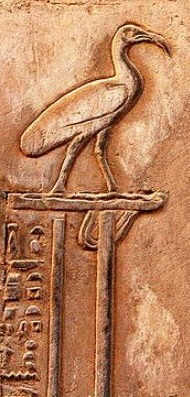
| 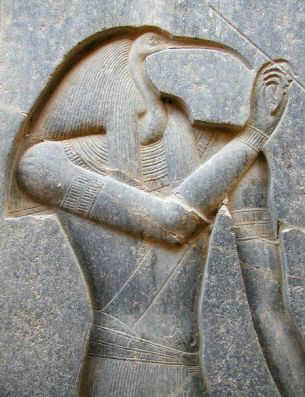
| Thoth as an Ibis at the temple at Kom Ombo. | Thoth relief Luxor Temple |
Thoth and the Baboon
In ancient Egyptian mythology Thoth is connected with baboons but it is unclear that Thoth the god was actually represented as a baboon as most would suggest. The baboon was a symbol of Thoth and seen to undertake work he directed. Baboons are often shown directing scribes in their work and involved with duties relating to the measurement of time. Many of the gods of the most ancient Egyptians were subsumed (meaning absorbed) into new deities. The practice of creating new deities, by combining them with the attributes of old gods, is called 'syncretism'. It is possible that this was the case with Hedjwer, Babi and then Thoth. The Ancient Egyptians identified the baboon with at least two main deities before Thoth - refer to the article on Baba for associations between Thoth and the baboon. Cult Center of Thoth - Hermopolis (Khnum)
Cities that were cult centers became extremely rich and therefore powerful. The Egyptian Priests of Hermopolis vied for position and power, re-inventing gods and creation myths to ensure that Hermopolis retained its position as one of the great cult centers of ancient Egypt. The city of Hermopolis had been a cult center for the worship of Baba and Hedjwer and as time passed its own version of the creation myth in respect of the Ogdoad of Hermopolis was created. During the late period of Egyptian history Khnum (Hermopolis Magna), in Lower Egypt also becoming the capital. The cult gained prominence with Thoth as the creator god. Thoth and the Creation Myth
In ancient Egyptian mythology, in the Ogdoad creation myth, Thoth gave birth to Atum Ra by laying an egg, while in the form of an ibis. The sound of his song was thought to have created four frog gods and snake goddesses of the Ogdoad who sang the song of Thoth, helping the sun journey across the sky. Cult Center for the Worship of Thoth
The Cult Center at Hermopolis housed the Great Temple of Thoth, and also had a sanctuary that was one of the great centres of Egyptian learning for priests and was called Het Abtit, 'The House of the Net'. The priests were taught various secret spells, ceremonies and rituals in relation to survival in the Underworld increasing their powers in ancient Egyptian society. There were secret halls containing historical records which had been kept for thousands of years including forty-two sacred writings of Thoth (42 Books of Thoth) encapsulating all the training and knowledge of Egyptian priests and scribes and described the instructions for achieving immortality. There were both priests and priestesses, mysteries and initiations rituals for each separately, and ceremonies for both. The priests were taught the secret rites and observances, astrology, law, music, writing, cosmography, geography, medicine, mathematics and measures. Ibises were reared specifically for sacrificial purposes and millions of dead ibis were mummified and buried in honor of Thoth. A great annual festival called the Feast of Thoth was celebrated in the Inundation season. 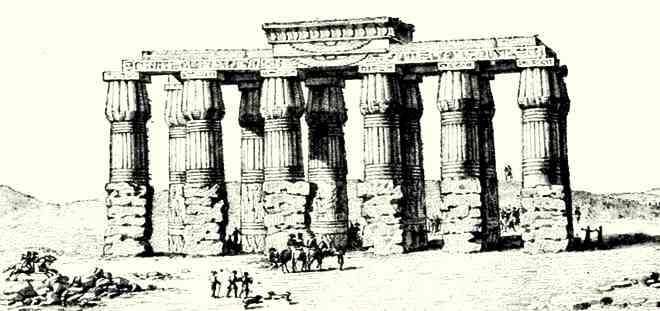
Temple of Thoth at Hermopolis Thoth and Hermes - The Emerald Tablets of Thoth
Thoth and the Greek god Hermes were both gods of writing and of magic in their respective cultures and during the Greco-Roman Period (332 BC - 641 AD) the two gods were worshipped in what had been the Temple of Thoth in at Hermopolis. "The Emerald Tablets of Thoth" or the "Secret of Hermes" as the Hermetic Corpus was a table made of green stone that contained a series of sacred texts. These secret and sacred texts were believed to reveal the secret of life, the primordial and all other substances and provided the key to the ideas of the earth, fire, the sun and the moon. The Emerald Tablets of Thoth were believed to be a combination of the knowledge and wisdom of Hermes and Thoth in layers of cryptic meanings. The sacred texts contained in the Emerald Tablets of Thoth survived in eastern Byzantine libraries. Their re-discovery and translation into Latin during the late-fifteenth century was sought by European alchemists looking for the recipe for alchemical gold and the secrets of raising the consciousness to a new degree. The Emerald Tablets of Thoth became a core element in the foundation of alchemy and commentaries and/or translations were published by famous people including Roger Bacon, Aleister Crowley, Albertus Magnus, C.G. Jung and Isaac Newton. Thoth and the Tree of Life
Thoth, the secretary of the sun god Ra and scribe of the Underworld, played an important role in the myths relating to the Tree of Life. The Tree of Life was believed to hold the Knowledge of the Divine Plan or the equivalent to a map of destiny which existed from when the world was created, marking the beginning of time. Thoth wrote the king's name and the length of his reign on the Tree of Life which protected the ruler and perpetuated his name. Thoth and his counterpart Seshat were the guardians of the sacred hieroglyphs. 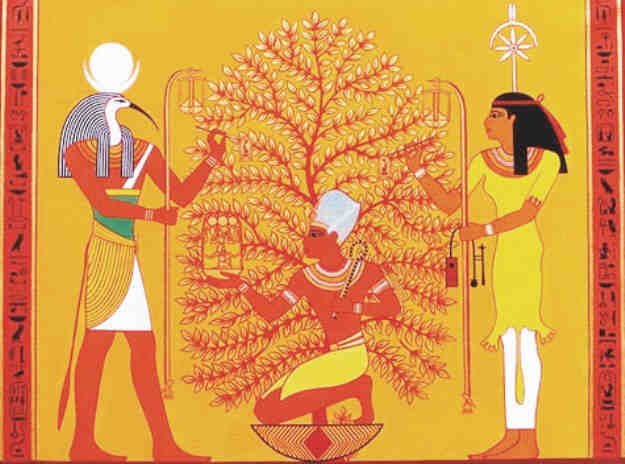
|